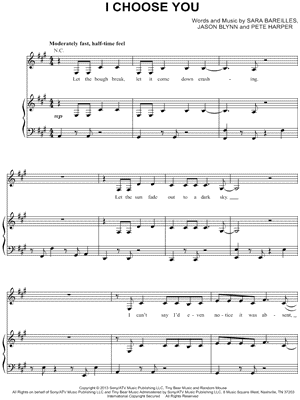

The bridge really brings something new to the song, but we also finally get an expansion of the calm music from before the first chorus. Throughout the song, the words and emphasis are crystal clear and never overstated.


I always get a rush when the chorus hits after that calm, with the additional movement in the strings and the high vocal backup. Then, just before the verse ends, the beat drops away and we get a moment of calm decorated by a delicate rolled piano chord. Bareilles's smooth voice then appears on top, with inspired string writing that mirrors the voice. She starts the track with some solid, open-fifth chords that are about as prominent as her piano playing gets this album, but strangely sparse enough to prompt questions. I'll use it as an example of what I think works in the rest of album: varied texture, continuity, and added musical meaning. Bareilles's piano is still present, but is mostly backgrounded, a far cry from the piano prominence of Little Voice.īesides the now-ubiquitous anthem "Brave," I think "Hercules" is really the most exiting track. Partly, Bareilles's channeling some Sara McLachlin with her vocal and instrumental production, especially in "Satellite Call," but mostly it's just exciting and new. The varied musical textures are also a leap in a new direction. Perhaps The Blessed Unrest features a bit too many slow tracks, but even in those, Bareilles's story-telling singing keeps me interested. The album has a surprising range of emotions, from the attempting cheerfulness of "Little Black Dress" to the longing of "Cassiopeia" to the emotional solidness of "Brave" to the unrepentant but mature love song "I Choose You." The emotions are more on the surface than in her second album, the mostly forgettable Kaleidoscope Heart. Bareilles explores the theme throughout the record, both in lyrical content and musical direction. Graham, who invented a whole new style and method of dance, really exemplifies this. July is still last month, right? The album title comes from a quote by Martha Graham, the great American dance pioneer, and is really about moving on and continuing to change, instead of giving into routine and stagnation. In a new attempt to review albums sooner after their release, this week I'm reviewing Sara Bareilles' third album, The Blessed Unrest.


 0 kommentar(er)
0 kommentar(er)
